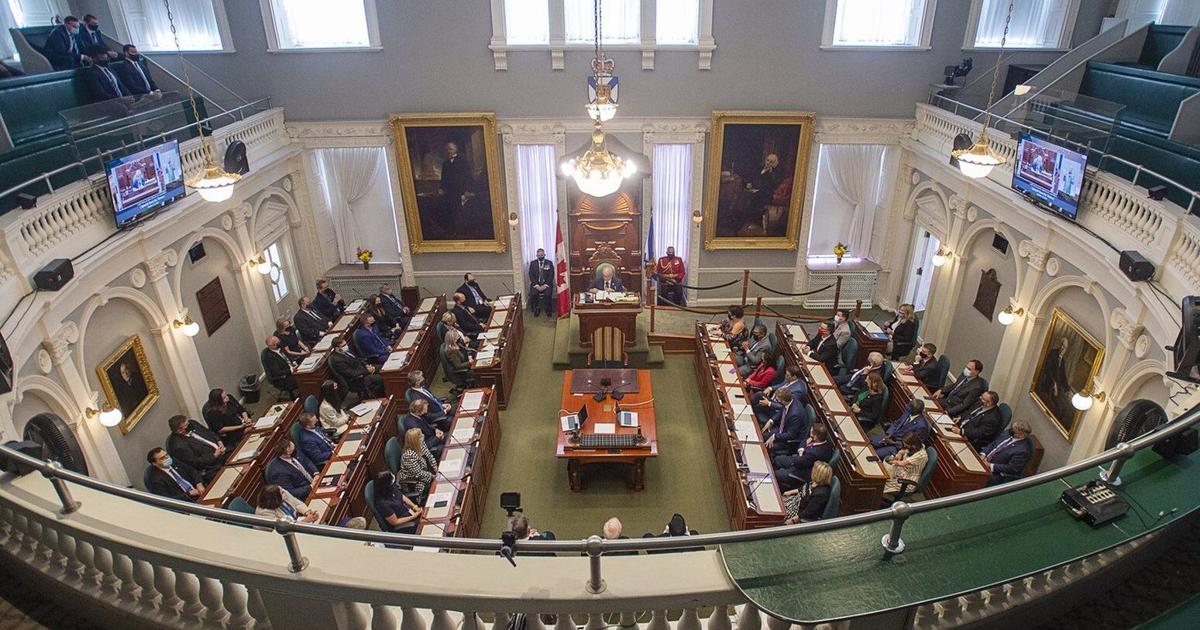HALIFAX – Limits on the collection of Nova Scotians’ social insurance numbers are part of a sweeping bill tabled on Tuesday by the provincial government as the legislature opened for its fall sitting.
The bill includes one new piece of legislation and amends seven other acts dealing with issues as diverse as domestic violence and protests that block logging roads on Crown land.
Colton LeBlanc, the acting minister of Service Nova Scotia, said the government wants to limit companies’ access to personal information in response to a cyberattack at the province’s privately owned power utility that saw a wide range of data, including SINs, stolen from thousands of customers.
Under the new bill, “the collection of SINs will be prohibited unless authorized by the regulations,” LeBlanc told reporters. “Government bodies will continue to be able to collect SINs for administrative purposes. Businesses will be permitted to collect SINs for legitimate purposes such as income tax reporting for employees.”
LeBlanc said the legislation is not retroactive and wouldn’t compel Nova Scotia Power to delete the SINs it currently holds. He said the act is expected to come into force early next year to allow time for the regulations to be prepared.
Meanwhile, proposed amendments would make it illegal to “block or obstruct the use of or impede access to” forest access roads on Crown land. Government officials said the proposed changes would allow the removal of protest camps or other obstructions for safety and economic reasons.
Natural Resources Minister Tory Rushton said the move was made at the request of conservation officers and isn’t meant to stifle protests over logging, such as one that has been ongoing at Hunter’s Mountain in Cape Breton.
“We have no objection to peaceful protests,” Rushton said, adding the move is about safety in areas where heavy equipment operates. Both he and Premier Tim Houston said they weren’t pressured by the forestry industry to include the amendments.
Under the changes, the fine for failing to comply with a removal order would increase from $2,000 and/or six months in jail to $50,000 and/or six months in jail.
Included in the wide-ranging legislation, known as an omnibus bill, the government wants to make it easier for domestic abuse victims to modify a lease to be in their name when their abuser moves out. The new lease would be under the same terms and conditions as the previous one.
The premier was asked why it was necessary to gather so many diverse bills under one act.
“It’s all protecting Nova Scotians, they are all important topics and there will be lots of time to debate (the bill),” Houston said, adding that he wasn’t concerned the government was giving short shrift to the issues.
However, opposition leaders said the omnibus bill is a continuation of a pattern that began during the spring session when the government brought forward an expansive bill that dealt with the powers of the auditor general and access to information.
“There isn’t a role for an omnibus bill of this nature in a responsible government,” said NDP Leader Claudia Chender. “This is sloppy legislation, done in haste in order to keep the public in the dark.”
Interim Liberal leader Derek Mombourquette said it’s obvious the government wants to end the legislative session as quickly as possible.
“When you do this, you don’t get the fulsome debate and the opportunity to speak at length on all of these bills, so it’s unfortunate they do this, but it’s been a trend that we are seeing and it’s not right,” Mombourquette said.
The NDP said Tuesday that it will pressure the government to address affordability during the sitting, and started by introducing legislation to lower power bills. Chender said her party wants the government to issue a rebate to residents that would lower Nova Scotia Power bills by 10 per cent. The proposed rebate would cost about $140 million, she said.
Also on Tuesday, the government tabled a comprehensive 135-page revision of its Traffic Safety Act, which was first passed in 2018 but was never entered into force. The sweeping bill would modernize the rules of the road and would allow for the introduction of measures such as photo radar.
This report by The Canadian Press was first published Sept. 23, 2025.
— With files by Lyndsay Armstrong in Halifax



